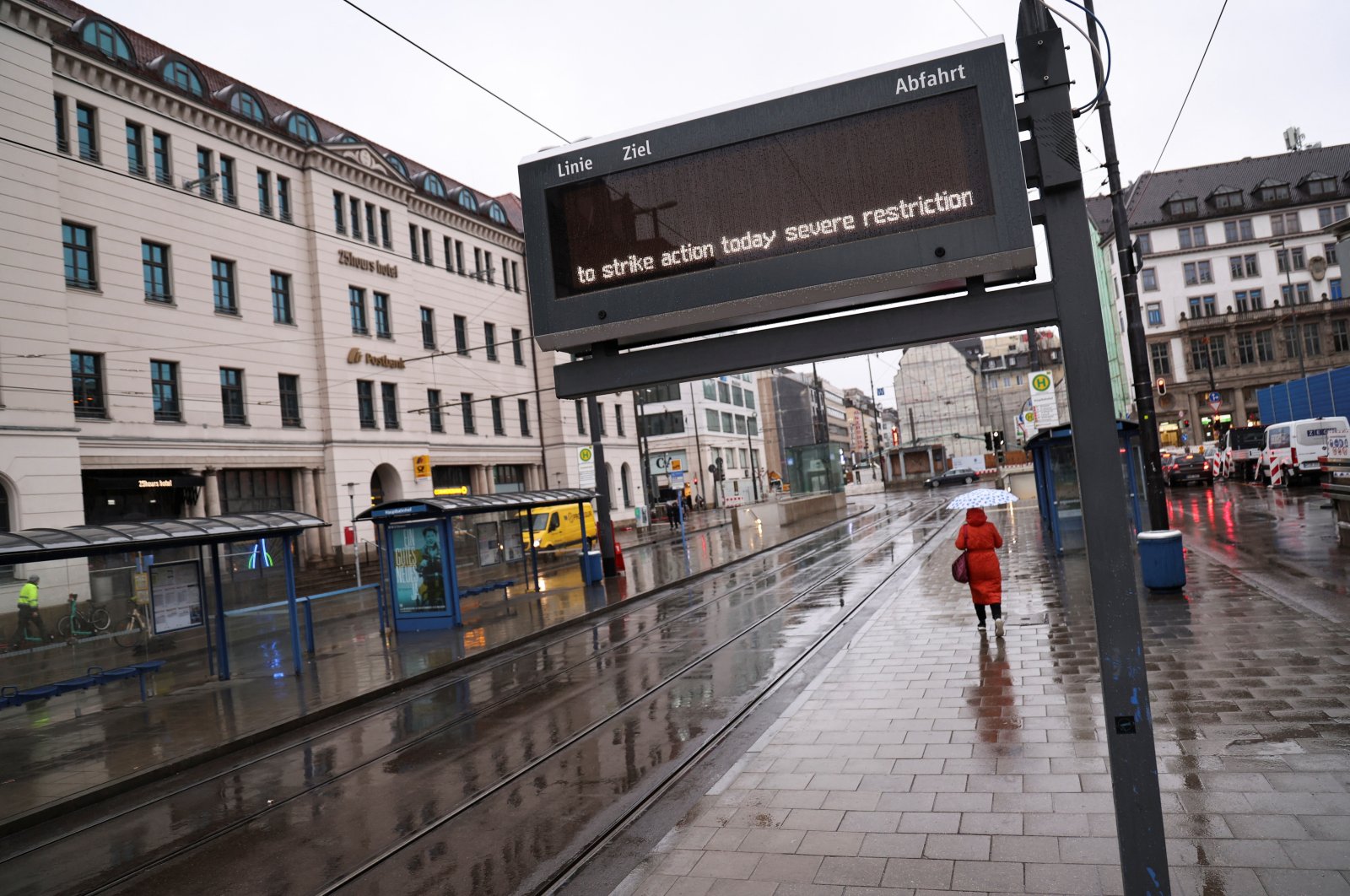
Transportation hubs throughout Germany were at a standstill on Monday morning, disrupting millions of commuters and travelers at the start of the work week during one of the largest walkouts in decades in Europe’s largest economy.
Workers at airports, ports, railways, buses and metro lines throughout the country heeded a call by the Verdi trade union and railway and transport union EVG for the 24-hour walkout.
"A labor struggle that has no impact is toothless,” Verdi boss Frank Werneke told public broadcaster Phoenix.
He acknowledged the stoppage would inflict pain on many commuters and holiday-makers, "but one day of strain with the prospect of reaching a wage agreement is better than weeks of industrial action.”
The strikes are the latest in months of industrial action that has hit major European economies as higher food and energy prices dent living standards.
Two of the country’s largest airports, Munich and Frankfurt, suspended flights, while German rail operator Deutsche Bahn canceled long-distance rail services. Striking workers wearing red high-visibility jackets blew horns and whistles through an empty Munich train station.
Many commuters opted to drive, causing road delays; while those who could, worked from home.
Employees are pressing for higher wages to blunt effects of inflation, which reached 9.3% in February. Germany, which was heavily dependent on Russia for gas before the war in Ukraine, has been particularly hard hit by higher prices as it scrambled for new energy sources, with inflation rates exceeding the euro-area average in recent months.
Persistent cost pressures have pushed central banks to a series of interest rate increases, though policy-makers have said it is too early to talk of a price-wage spiral.
The Verdi union is negotiating for around 2.5 million employees in the public sector, including in public transport and airports. The railway and transport union EVG negotiates for about 230,000 employees at Deutsche Bahn and bus companies.
In the hours running up to the strike, both sides dug in their heels, with union bosses warning that considerable pay hikes were a "matter of survival” for thousands of workers.
"Millions of passengers who depend on buses and trains are suffering from this excessive, exaggerated strike,” a Deutsche Bahn spokesperson said on Monday.
Verdi is demanding a 10.5% wage increase, which would see pay rising by at least 500 euros ($538) per month, while EVG is asking for a 12% raise or at least 650 euros per month.
High inflation, also seen elsewhere last year, has struck many workers, said Ulrich Silberbach of the Civil Service Federation.
"We have recorded drops in real wages, and these need to be balanced out,” he told reporters in Berlin, adding that some of his union’s members in larger cities must apply for state benefits to afford rent.
Silberbach said that he hoped employers would increase their offer in upcoming talks – otherwise, unions might have to consider an open-ended strike.
Verdi labor union’s Werneke said the action was a matter of survival for millions of workers amid high inflation, according to the Bild am Sonntag newspaper.
Stranded passengers expressed both sympathy and unhappiness about the strike action.
"Yes, it’s justified, but I never went on strike in my entire life, and I have been working for more than 40 years. At the same time, in France, they go on strike all the time about something,” said passenger Lars Boehm.
Further walkouts
EVG chairman Martin Burkert told the Augsburger Allgemeine newspaper on Monday that employers had not yet made a viable offer and warned that further strikes were possible, including over the Easter holiday period.
The union said over 30,000 railway workers alone participated in the massive walkout.
"The willingness to strike is very high, and the anger among workers over being stalled by employers is huge,” said EVG negotiating committee member Kristian Loroch.
"We are striking today because in collective bargaining, despite the tight financial situation for many workers, we have not been presented with anything worthy of serious negotiations,” he added.
Deutsche Bahn called the union’s demands exaggerated and warned that millions of commuters would be affected.
"Thousands of companies that normally send or receive goods by rail will also suffer. The environment and the climate will also suffer in the end. Today’s winners are the oil companies,” Deutsche Bahn spokesperson Achim Strauss said.
The company on Sunday said the strike was "completely excessive, groundless and unnecessary,” and employers are warning that higher wages for transport workers would result in higher fares and taxes to make up the difference.
"Train tickets that could not be used because of the disruption will remain valid, and travelers should check the company’s website for updates," Strauss said.
The German airport association, which estimated about 380,000 air travelers would be affected, said the walkout "went beyond any imaginable and justifiable measure.”
Monday’s walkouts are part of waves of disruptive labor strikes in wealthy European countries recently, including France and Britain, where hundreds of thousands of transport, health, and education workers are pressing for higher wages.
Protests against President Emmanuel Macron’s pension reforms have sparked France’s worst street violence in years.
Commerzbank Chief Economist Joerg Kraemer said the economic impact of Monday’s strike was limited so far, but this could change if the strikes persisted over a longer time.
"The strike will strain people’s nerves. But economically, the losses will likely be limited to the transport industry because factories will continue to operate and many employees will be working from home,” he said.
The head of the Bundesbank, Joachim Nagel, said last week that Germany needed to avoid a price-wage spiral.
"To be clear: Preventing inflation from becoming persistent via the labor market requires employees accept sensible wage gains and that firms accept sensible profit margins. Despite signs of second-round effects, we have not observed a destabilizing price-wage spiral in Germany so far,” he said.
